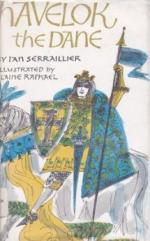But I will say that in Grimsby we felt not the worst, by reason of that wisdom of my father, and always Witlaf and his house shared with us. Hard it was here, but elsewhere harder.
And then came the pestilence that goes with famine always. I have heard that men have prayed to their gods for that, for it has seemed better to them to die than live.
With the first breath of the pestilence died Grim my father, and about that I do not like to say much. He bade us remember the words he had spoken of Havelok our brother, and he spoke long to Arngeir in private of the same; and then he told us to lay him in mound in the ancient way, but with his face toward Denmark, whence we came. And thereafter he said no more, but lay still until there came up suddenly through the thick air a thunderstorm from the north; and in that he passed, and with his passing the rain came.
Thereof Withelm said that surely Odin fetched him, and that at once he had made prayer for us. But the Welsh folk said that not Odin but the White Christ had taken the man who had been a father to them, and had staved off the worst of the famine from them.
Then pined and died my mother Leva, for she passed in her sleep on the day before we made the mound over her husband, and so we laid them in it together, and that was well for both, as I think, for so they would have wished.
So we made a great bale fire over my father’s mound, where it stood over the highest sandhill; and no warrior was ever more wept, for English and Welsh and Danes were at one in this. We set his weapons with him, and laid him in the boat that was the best—and a Saxon gave that—and in it oars and mast and sail, and so covered him therein. And so he waits for the end of all things that are now, and the beginning of those better ones that shall be.
That thunderstorm was nothing to the land, for it skirted the shores and died away to the south, and after it came the heat again; but at least it brought a little hope. There were fish along the shore that night, too, if not many; and though they were gone again in the morning, there was a better store in every house, for men were mindful of Grim’s teaching.
Now, of all men, Havelok seemed to feel the trouble of the famine the most, because he could not bear to see the children hungry in the cottages of the fishers. It seemed to him that he had more than his share of the stores, because so mighty a frame of his needed feeding mightily, as he said. And so for two days after my father died and was left in his last resting, Havelok went silent about the place. Here by the shore the pestilence hardly came, and so that trouble was not added to us, though the weak and old went, as had Grim and Leva, here and there.
Then, on the third day, Havelok called Arngeir and us, and spoke what was in his mind.
“Brothers, I may not bear this any longer, and I must go away. I can do no more to help than can the weakest in the town; and even my strength is an added trouble to those who have not enough without me. Day by day grows the store in the house less; and it will waste more slowly if I am elsewhere.”




